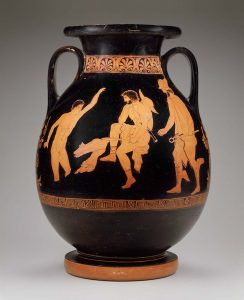Podcast episode
January 17, 2018
Episode 20: All for One, and One for All: Parmenides of Elea

Parmenides of Elea is the father of western metaphysics, and one of the most fascinating and strange figures of ancient philosophy. Anyone whom Aristotle called ‘almost insane’ can’t be all bad, right?
Parmenides’ legacy to philosophy is his intense meditation on the problem of Being, in itself, by itself, as the ultimate ground of existence. It is very different to understand what Parmenides is telling us about being: it is eternal, immutable, without beginning or end, and, most perplexingly of all, it is one. Generations of philosophers have speculated on what all of this might mean, none more so than Plato. It is impossible to understand Plato fully without understanding the importance of Parmenides for his thought, which would be reason enough to include Parmenides in the podcast on its own.

But there are other reasons to include this early exponent of the ultimate ground of existence. His philosophy is conveyed not in a dry metaphysical treatise, but in the traditional form of the Greek epic hexameter poem. This poem narrates a journey in a chariot, accompanied by maiden goddesses, the Daughters of the Sun, who convey Parmenides through the Gates of Night and Day, where he meets a goddess who describes for him two possible paths: the Way of Truth and the Way of Seeming. The journey, it seems, is to the Underworld, the goddess, it seems, is initiating Parmenides into a new way of seeing reality, and western thought, it seems, would never be the same again.
Works Discussed in this Episode:
Primary:
- Apuleius, Metamorphoses. The initiation passage at 11.23 reads Accessi confinium mortis et calcato Proserpinae limine per omnia vectus elementa remeavi; nocte media vidi solem candido coruscantem lumine; deos inferos et deos superos accessi coram et adoravi de proxumo. Ecce tibi rettuli quae, quamvis audita, ignores tamen necesse est: ergo quod solum potest sine piaculo ad profanorum intellegentias enuntiari, referam.
- Aristotle tells us that the theory of Parmenides is ‘almost insane’ at On Generation and Corruption (Gen. corr. 325a19).
- Hesiod, Theogony lines 736-66 for the House of Night.
- Homer, Od. X, l. 504 – XI, l. 50.
- Virgil, Aeneid Book Six contains an amazing underworld journey; see lines 640-2 for the heavens below.
Secondary
- Coxon, A. H., 1986. The Fragments of Parmenides: A Critical Text with Introduction, Translation, the Ancient Testimonia and Commentary. Van Gorcum, Assen/Maastricht is pretty widely held to be the best English edition of the fragments of Parmenides. The updated version is Coxon, A., McKirahan, R. (Ed.), 2009. Parmenides Press, Las Vegas, NV/Zurich/Athens, which features the new translations by McKirahan quoted in this episode.
- Curd, P., 1998. The Legacy of Parmenides: Eleatic Monism and Later Presocratic Thought. Princeton University Press, Princeton, NJ.
- Kingsley, P., 1999. In the Dark Places of Wisdom. Golden Sufi Publishing, Inverness, CA.
- Owen, G. (1986). ‘Eleatic Questions’. In: Logic, Science, and Dialectic: Collected Papers in Greek Philosophy, Ithaca, NY.
Recommended Reading (and Listening):
Be sure to check out Peter Adamson’s episode on Parmenides to get some of the philosophical basics which this episode hardly looks at. For a brief introduction to Parmenides’ philosophy, the article at the Stanford Online Encyclopedia of Philosophy is excellent.
- Brown, L. (1994). ‘The Verb ‘To Be’ in Greek Philosophy: Some Remarks’, Language. Companion to Ancient Thought 3 : 212-236.
- Burkert, W. (1969). ‘Das Proömium des Parmenides und die “Katabasis” des Pythagoras’, Phronesis 14 : 1-30.
- Cisgrive, M. (1974).’The ΚΟΥΡΟΣ Motif in “Parmenides”: B 1.24′, Phronesis 19 : 81-94.
- Cornford, F. (1933). ‘Parmenides’ Two Ways’, CQ 27 : 97-111.
- Feyerabend, B. (1984). ‘Zur Wegmetaphorik beim Goldblättchen aus Hipponion und dem Proömium des Parmenides’, Rheinisches Museum : 1-22.
- Henn, M. J., 2003. Parmenides of Elea: A Verse Translation with Interpretative Essays and Commentary to the Text. Praeger, Westport, CT/London.
- Owens, J. (1979). ‘Knowledge and “Katabasis” in Parmenides’, The Monist 62 : 15-29.
- Palmer, J., 2009. Parmenides and Presocratic Philosophy. Oxford University Press, Oxford.
Themes
Monism, Otherworld Journeys, Parmenides, Pre-Socratic Philosophy, Pythagoreanism


Calliope Irving
October 24, 2021
Calliope, they refer to Calliope..
Andrew Blaubaum
April 26, 2024
Very amusing fade-out finish to this episode 🙂